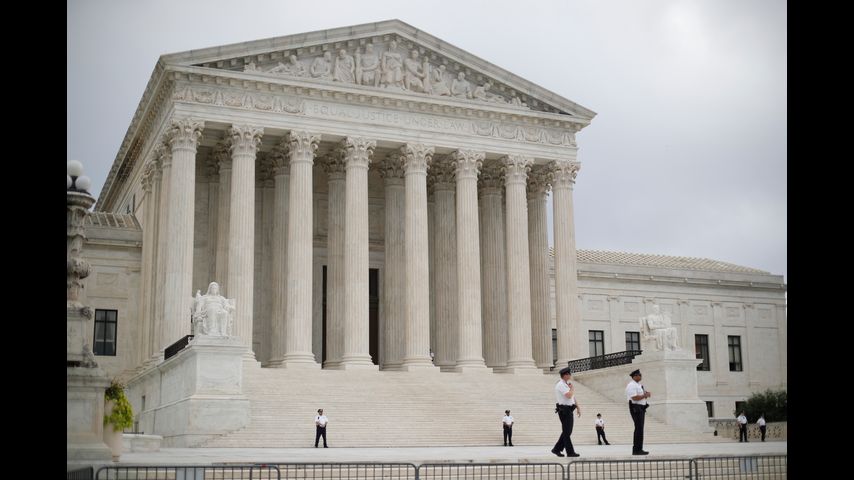How views of the Supreme Court have changed since 2022 abortion ruling, according to AP-NORC polling
WASHINGTON (AP) — Americans' views of the Supreme Court have moderated somewhat since the court's standing dropped sharply after its ruling overturning Roe v. Wade in 2022, according to a new poll. But concern that the court has too much power is rising, fueled largely by Democrats.
The survey from The Associated Press-NORC Center for Public Affairs Research found that about a third of U.S. adults have "hardly any confidence at all" in the court, but that's down from 43% three years ago. As the new AP-NORC polling tracker shows, about half of Americans have "only some confidence" in the court, up from 39% in July 2022, while a relatively small number, about 1 in 5, have "a great deal of confidence," which hasn't shifted meaningfully in the past few years.
The moderate increase in confidence is driven by Republicans and independents.
Still, views of the nation's highest court remain more negative than they were as recently as early 2022, before the high-profile ruling that overturned the constitutional right to abortion. An AP-NORC poll conducted in February 2022 found that only around one-quarter of Americans had hardly any confidence in the court's justices.
Persistent divide between Republicans and Democrats
The partisan divide has been persistent and stark, particularly since the Dobbs ruling, when Democrats' confidence in the nine justices plummeted. The survey shows Republicans are happier than Democrats and independents with the conservative-dominated court, which includes three justices appointed by President Donald Trump, a Republican.
Few Republicans, just 8%, view the court dimly, down from about 1 in 5 in July 2022. For independents, the decline was from 45% just after the Dobbs ruling to about 3 in 10 now. The views among Democrats were more static, but they are also slightly less likely to have low confidence in the justices, falling from 64% in summer 2022 to 56% now.
In recent years, the court has produced historic victories for Republican policy priorities. The justices overturned Roe, leading to abortion bans in many Republican-led states, ended affirmative action in college admissions, expanded gun rights, restricted environmental regulations and embraced claims of religious discrimination.
Many of the court's major decisions from this year are broadly popular, according to a Marquette Law School poll conducted in July. But other polling suggests that most don't think the justices are ruling neutrally. A recent Fox News poll found that about 8 in 10 registered voters think partisanship plays a role in the justices' decisions either "frequently" or "sometimes."
Last year, the conservative majority endorsed a robust view of presidential immunity and allowed Trump to avoid a criminal trial on election interference charges.
In recent months, the justices on the right handed Trump a string of victories, including a ruling that limits federal judges' power to issue nationwide injunctions.
Katharine Stetson, a self-described constitutional conservative from Paradise, Nevada, said she is glad that the court has reined in "the rogue judges, the district judges around the country" who have blocked some Trump initiatives.
Stetson, 79, said she is only disappointed it took so long. "Finally. Why did they allow it get out of hand?" she said.
Growing concerns the court is too powerful
Several recent decisions were accompanied by stinging dissents from liberal justices who complained the court was giving Trump too much leeway and taking power for itself.
"Perhaps the degradation of our rule-of-law regime would happen anyway. But this court's complicity in the creation of a culture of disdain for lower courts, their rulings, and the law (as they interpret it) will surely hasten the downfall of our governing institutions, enabling our collective demise," Justice Ketanji Brown Jackson wrote when the court ruled on nationwide injunctions.
The July AP-NORC poll found a growing similar sentiment. About 4 in 10 U.S. adults now say the court has "too much" power in the way the federal government operates these days. In April, about 3 in 10 people were concerned about the court's power.
The shift is largely due to movement among Democrats, rising from about one-third in April to more than half now.
Debra A. Harris, a 60-year-old retired state government worker who now lives in Winter Haven, Florida, said the court's decisions in recent years "just disgust me to my soul."
Harris said the court has changed in recent years, with the addition of the three justices appointed by Trump.
"I find so much of what they're doing is based so much on the ideology of the Republican ticket," Harris said, singling out last year's immunity decision. "We don't have kings. We don't have dictators."
George Millsaps, who flew military helicopters and served in Iraq, said the justices should have stood up to Trump in recent months, including on immigration, reducing the size of the federal workforce and unwinding the Education Department.
"But they're bowing down, just like Congress apparently is now, too," said Millsaps, a 67-year-old resident of Floyd County in rural southwest Virginia.
___
The AP-NORC poll of 1,437 adults was conducted July 10-14, using a sample drawn from NORC's probability-based AmeriSpeak Panel, which is designed to be representative of the U.S. population. The margin of sampling error for adults overall is plus or minus 3.6 percentage points.
___
Follow the AP's coverage of the U.S. Supreme Court at https://apnews.com/hub/us-supreme-court.





